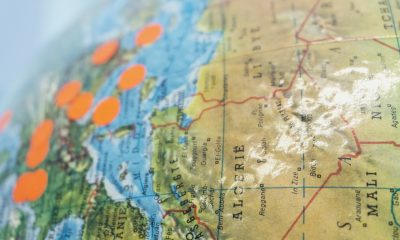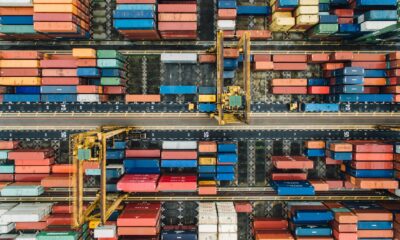Africa
Sub-Saharan Africa: IMF Forecasts Growth of 3.8% in 2024
The IMF predicts sub-Saharan Africa’s growth to rise from 3.4% in 2023 to 3.8% in 2024 and hit 5% in 2025. Niger leads with significant growth. The region’s GDP could reach 10.4% by 2024, partly due to oil revenue. The departure of AES countries from ECOWAS raises investor uncertainty, but sub-Saharan Africa’s debt, stable at 60% of GDP, is expected to decline with economic recovery and budgetary adjustments.

Growth in sub-Saharan African countries should increase from 3.4% in 2023 to 3.8% in 2024, then reach 5% in 2025, revealed Monday in Abidjan, Luc Eyraud, director of regional studies at the International Monetary Fund. (IMF)
Speaking at a conference held at the headquarters of the Ivorian Ministry of Finance, Eyraud stressed that almost two thirds of the countries concerned in this region should expect increasing growth, including Niger, which is expected to record this year the most significant growth in sub-Saharan Africa.
GDP in sub-Saharan Africa could reach 10.4% according to IMF
The international institution forecasts that its real gross domestic product (GDP) could reach 10.4% at the end of 2024, which can be explained in particular by its income from oil exploitation. Referring also to the decision of Niger, Mali and Burkina Faso, members of the Alliance of Sahel States (AES), to withdraw from the Economic Community of West African States (ECOWAS), Eyraud , whose comments were relayed by the media, estimated that the impact was “limited” for the moment.
“The AES countries have decided to leave ECOWAS, but not the West African Economic and Monetary Union (UEMOA). Their departure from ECOWAS raises questions of uncertainty and the perception of investors who may have difficulty distinguishing between the commercial trade zone that is ECOWAS and the single currency zone that is the WAEMU. There will be a disruption of trade and less significant disruptions to the flow of individuals,” he indicated.
Stressing that the IMF was for integration, he noted that after ten years of continuous increase, the debt of sub-Saharan Africa had stabilized at 60% of GDP and should follow a downward trend, thanks to the recovery observed global economy and the serious budgetary adjustment policies carried out by the countries of the region.
Eyraud indicated that these policies had, among other things, made it possible to reduce the median inflation rate from almost 10% in November 2022 to around 6% in February 2024 in the zone. The IMF official, on the other hand, affirmed that Côte d’Ivoire had high growth potential in the region.
“From 6.2% last year, Ivory Coast’s real GDP should stand at 6.5% this year, driven by its agriculture and revenues from the three cycles of exploitation of the gas and oil field. Whale,” he said.
“However, Côte d’Ivoire must improve its resilience, by equipping itself with climate resilience tools and policies. Ivorian debt, representing 57% of its GDP at the end of 2023, is at moderate risk and Côte d’Ivoire issued, last January, two Eurobonds, worth 2.6 billion US dollars, to balance its liquidity and solvency ratios. Its debt ratio should fall to represent 53% of its GDP by 2027,” he estimated.
__
(Featured image by David_Peterson via Pixabay)
DISCLAIMER: This article was written by a third party contributor and does not reflect the opinion of Born2Invest, its management, staff or its associates. Please review our disclaimer for more information.
This article may include forward-looking statements. These forward-looking statements generally are identified by the words “believe,” “project,” “estimate,” “become,” “plan,” “will,” and similar expressions. These forward-looking statements involve known and unknown risks as well as uncertainties, including those discussed in the following cautionary statements and elsewhere in this article and on this site. Although the Company may believe that its expectations are based on reasonable assumptions, the actual results that the Company may achieve may differ materially from any forward-looking statements, which reflect the opinions of the management of the Company only as of the date hereof. Additionally, please make sure to read these important disclosures.
First published in LES ECO.ma. A third-party contributor translated and adapted the article from the original. In case of discrepancy, the original will prevail.
Although we made reasonable efforts to provide accurate translations, some parts may be incorrect. Born2Invest assumes no responsibility for errors, omissions or ambiguities in the translations provided on this website. Any person or entity relying on translated content does so at their own risk. Born2Invest is not responsible for losses caused by such reliance on the accuracy or reliability of translated information. If you wish to report an error or inaccuracy in the translation, we encourage you to contact us

-

 Markets6 days ago
Markets6 days agoStock Markets Surge Amid Global Uncertainty, But Storm Clouds Loom
-

 Africa3 days ago
Africa3 days agoMorocco Charts a Citizen-Centered Path for Ethical and Inclusive AI
-

 Crowdfunding1 week ago
Crowdfunding1 week agoSavwa Wins Global Design Awards and Launches Water-Saving Carafe on Kickstarter
-

 Business6 days ago
Business6 days agoDow Jones Nears New High as Historic Signals Flash Caution

























